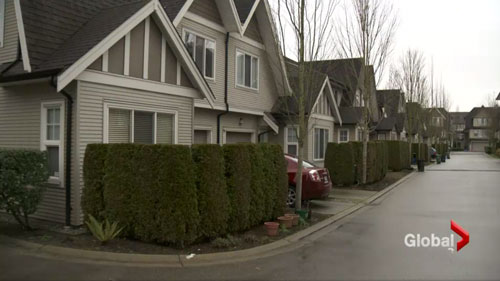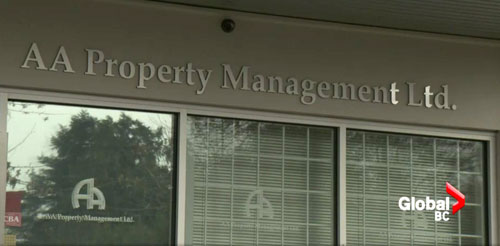Chinese-only strata council prompts human rights complaint
Richmond News
Graeme Wood
21 December 2015
A group of Richmond homeowners has filed a complaint with the BC Human
Rights Tribunal after allegedly being discriminated against by a new
Chinese-speaking strata council.
Andreas Kargut, who filed the claim on behalf of several other
Wellington Court strata members, told the Richmond News a group of
Mandarin-speaking homeowners purposefully voted to expel non-Mandarin
speaking members from council, in a contentious vote this summer.
Since then, the new council has moved to conduct all official business, including council meetings, in Mandarin.
“Anyone they deemed who was non-Mandarin speaking, they ousted,” said Kargut.
Wellington Court is a 54-unit townhouse development on Heather Street near Garden City Park.
“For the most part, it was a very harmonious place to live,” said Kargut.
The new council was formed after one Chinese member gathered 37 proxy
votes to expel the non-Mandarin speaking council members, contended
Kargut.
An email from the new strata president, Ed Mao, states: “We have no
intention of using English during the meeting on December the 8th.
That’s the most efficient way for the team this year.”
Mao could not be reached for comment.
cost overruns
Kargut said the new council was formed after some strata members took
issue with a paint job that had cost overruns following the discovery
of some rotting wood beams in need of replacement.
He said some members started rumours that the non-Mandarin speakers were stealing from the contingency fund.
The present council also fired its long-time property manager, First
Service Residential (via Colliers in a portfolio acquisition).
“So now we have an all-Manadarin speaking council that fired our property manager and brought on another company.
“I think they were searching for a property manager that was cheaper,”
said Kargut, who attended the last meeting as an observer.
“I wanted to see if they had the nerve to go ahead with (Mandarin only),” he said.
“At the end, he asked if I had any questions, but how was I supposed to
ask any questions when I couldn’t understand what was going on for the
past hour and a half?” noted Kargut.
Prior to the alleged discriminatory takeover, the past council had
offered official interpretation services for Mandarin speakers.
Wellington Court also already featured several bilingual outdoor signs.
Kargut said the new council told him it would hire its own interpreter
for English speakers but not an official interpreter. He suspects that
decision had to do with costs.
Tony Gioventu, executive director of the Condominium Homeowners’
Association, told the Richmond News he’s never seen a case like this.
While he’s seen “three or four” instances in Richmond over the past
five years concerning language problems, all of them have been resolved
“quickly” with English-to-Mandarin translation services, not the other
way around.
There is nothing in the B.C. Strata Property Act that defines what
languages can be used in official strata meetings. However, Gioventu
noted that official languages apply to legislative procedures and the
court systems.
“The big question is whether that would extend to a strata corporation
because it is bound by provincial legislation,” said Gioventu.
The News asked the Ministry Responsible for Housing for legal clarification.
“The Strata Property Act does not specify what language strata meetings
should be conducted in or require interpretation services. A
strata corporation may wish to get advice from a lawyer on how best to
meet the various language preferences of its owners,” the Ministry
said, via email.
“It’s a human rights issue in any case because English and French are
our official languages and these individuals are not capable of
communicating for the business of their strata underneath provincial
legislation. So that’s what opens the door,” added Gioventu.
He said the problem in Richmond may lie in the extreme concentration of Mandarin speakers in the city.
“I don’t know what the solution is.
“I go to some communities where everyone speaks Punjabi, and there’s
only one person who doesn’t speak Punjabi, and they’re very respectful
and conduct their business in English. But, even there, there have been
some serious misunderstandings about how the law applies as a result of
the interpretations,” noted Gioventu, who believes it is imperative to
have official translation services.
strata fees are under $200 per month
Presently, strata fees are under $200 per month, Kargut said, but the
fear amongst the outcast members is that the property will not be
maintained properly.
Kargut points to a cement slab at the sidewalk entrance to one of the
homes that has recently been raised. It poses a tripping hazard to
visitors and is on common property.
“We’d usually have that fixed in no time, but it’s just sitting there now,” he said.
Gioventu said immigrants from densely populated cities tend not to
understand the concept of common property and its required maintenance.
running your building to failure
“It’s not just a Chinese thing.
“One of the challenges we have seen is there’s a sense of basically
running your building to failure. You use it as best you can, and then
you sell it off because land is in such high demand,” he said.
The complaint has yet to be considered by the Tribunal.
—†—
Globe and Mail
Here is a Globe and Mail article on the same issue.
Unfortunately, it does not mention any references to lower fees which
may have a big influence on why the old board was voted out, the
property management company replaced and why less expensive translation
services provided by the new board.
http://bit.ly/1OncXzZ
CBC
Again, this story is focusing on an anti-Chinese-Canadian angle. I
suspect that it really is a mandarin speaking board trying to save
money and keep the fees low. I wish I could hear the board's side.
http://bit.ly/1YBT8o7
—†—
Strata owners looking to set language precedent at B.C. Human Rights Tribunal
Global News
By John Hua
21 February 2016

Andreas Kargut says confirmation that his case will be heard by the
B.C. Human Rights Tribunal has fueled efforts from other strata owners
feeling marginalized.
“It’s validated that we are being oppressed based on our inability to speak an unofficial language which is Mandarin,” he said.
Several former members of the Wellington Court strata council in
Richmond allege they were systematically voted out and then told that
meetings would no longer include English. They were told in an email
from council president, Ed Mao, that it “was the most efficient way for
the team this year.”
Alex Tan was the last non-Mandarin member of the council and alleges
once other members realized he needed a translator, they worked to get
him ousted.
“They would all converse in Mandarin and the property manager would
translate it to me in English,” said Tan. “They sent emails to each
other but they didn’t send them to me.”
READ MORE: B.C. condo owners file human rights complaint after board holds meetings in Mandarin
The current strata council, which is named the respondent, must file of
notice to settle or officially respond by March 23. If it chooses to
respond, is has another 70 days to apply for a dismissal without a
hearing. The letter from the B.C. Human Rights Tribunal states the
complaint remains unproven.

Multiple attempts to reach with Mao or representatives from AA Property Management Inc. for comment were unsuccessful.
The next strata council meeting has been scheduled for February 23.
While there have been reports from media and local politicians that it
may be in English or translated, strata owners say there has been no
communication directly with them.
“There’s been nothing said to us as owners. Particularly those of us
who will be attending the council meeting,” said strata owner Harry
Gray.
Kargut says even if an accredited translator is hired, that will not be enough for a settlement.
“That’s only a band-aid. I think that masks the problem. We have to go all the way to set a precedent,” he said.
In the video, the ex-board members
complain that the condo corporation is not being maintained as well as
it was. It is possible that the Mandarin-speaking board was elected as
a slate, with the intent to lower fees and not specifically to exclude
non-Mandarin speakers.
The board offered to hire a non-credited translator; again I think as a cost-cutting measure.
—CondoMadness
top
contents appendix
previous
next

